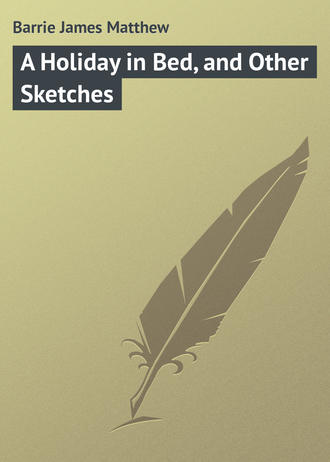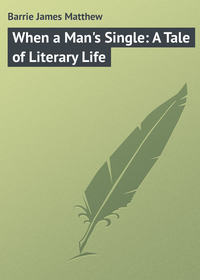 полная версия
полная версияA Holiday in Bed, and Other Sketches

Barrie J. M. James Matthew
A Holiday in Bed, and Other Sketches
JAMES MATTHEW BARRIE
James Matthew Barrie was born at Kirriemuir, Forfarshire, on May 9, 1860. Kirriemuir, as soberly stated by the Encyclopædia Britannica, is "a borough of barony and a market town of Forfarshire, Scotland, beautifully situated on an eminence above the glen through which the Gairie flows. It lies about five miles northwest of Forfar, and about sixty-two miles north of Edinburgh. The special industry of the town is linen weaving, for which large power-loom factories have recently been built." Mr. Barrie has made his birthplace famous as Thrums, after hesitating for a little between that name and Whins, which is the word used in the earliest Auld Licht sketches.
Only a part of Mr. Barrie's boyhood was spent in Kirriemuir. At an early age he went to Dumfries, where his brother was inspector of schools. He was a pupil in the Dumfries Academy. At that time Thomas Carlyle was a not unfrequent visitor to the town, where his sister, Mrs. Aitken, and his friend, the venerable poet editor Thomas Aird, were then living.
Carlyle is the only author by whom Mr. Barrie thinks he has been influenced. The Carlyle fever did not last very long, but was acute for a time. He fervently defended his master against the innumerable critics called into activity by Mr. Froude's biography. Apart from this, Dumfries seems to have left no very definite mark on his mind. The only one of his teachers who impressed him was Dr. Cranstoun, the accomplished translator from the Latin poets, and he rather indirectly than directly. In the Dumfries papers Mr. Barrie inaugurated his literary career by contributing accounts of cricket matches and letters, signed "Paterfamilias," urging the desirability of pupils having longer holidays. He was the idlest of schoolboys, and seldom opened his books except to draw pictures on them.
At the age of eighteen, Mr. Barrie entered Edinburgh University. His brother had studied in Aberdeen with another famous native of Kirriemuir, Dr. Alexander Whyte, of Free St. George's, Edinburgh. At Aberdeen you could live much more cheaply, also it was easier there to get a bursary, enough to keep soul and body together till an income could be earned. The struggles and triumphs of Aberdeen students greatly impressed Mr. Barrie, who has often repeated the story thus told in the Nottingham Journal: —
"I knew three undergraduates who lodged together in a dreary house at the top of a dreary street, two of whom used to study until two in the morning, while the third slept. When they shut up their books they woke number three, who arose, dressed, and studied till breakfast time. Among the many advantages of this arrangement, the chief was that, as they were dreadfully poor, one bed did for the three. Two of them occupied it at one time, and the third at another. Terrible privations? Frightful destitution? Not a bit of it. The Millennium was in those days. If life was at the top of a hundred steps, if students occasionally died of hunger and hard work combined, if the midnight oil only burned to show a ghastly face 'weary and worn,' if lodgings were cheap and dirty, and dinners few and far between, life was still real and earnest, in many cases it did not turn out an empty dream."
In 1882 he graduated, and was for some months in Edinburgh doing nothing in particular. In the meantime he saw an advertisement asking for a leader writer to an English provincial paper. The salary offered was three guineas a week. He made application for this, and found himself, in February, 1883, installed as leader writer to the Nottingham Journal. He was not editor, the work of arranging the paper being in other hands; but he was allowed to write as much as he pleased, and practically what he pleased.
During the last months of his stay in Nottingham, Mr. Barrie had begun to send articles to the London papers. The first of these was published by Mr. Stead, then editing the Pall Mall Gazette.
In March, 1888, a much more important book, "Auld Licht Idyls," was published. When Mr. Barrie came up to London he had letters of introduction from Professor Masson to an eminent publisher, and to Mr. John Morley. He took his "Auld Licht Idyls" to the publisher, and was told that, although they were pleasant reading, they would never be successful as a book. Mr. Morley, then editor of Macmillan, asked him to send a list of subjects on which he was willing to write. The request was complied with, but the subjects were returned by Mr. Morley with the singularly uncharacteristic comment that they were not sufficiently up to date. Mr. Morley, who has since read with great admiration all Mr. Barrie's works, was much astonished at having this brought to his remembrance the other day.
"When a Man's Single" was published in September, 1888, dedicated to W. Robertson Nicoll. The story was originally published in The British Weekly, but, as his manner is, Mr. Barrie made great changes in revising it for publication. It was well received, and was pronounced by the Daily News as "Perhaps the best single volume novel of the year." It is not at all autobiographical, though it gives the author's impressions of journalistic life in Nottingham and London. Perhaps the best parts of it are those devoted to Thrums, of which George Meredith expressed special admiration.
Mr. Barrie's greatest book, however, was yet to come. "A Window in Thrums" was published in May, 1889. It contained articles contributed to the National Observer, The British Weekly, and the St. James's Gazette, along with new matter. It is not too much to say that it was received with one burst of acclamation. It has been the most popular of the author's works, and it is hard to conceive how he can surpass certain parts of it. It has found admirers among all classes.
"My Lady Nicotine," reprinted from the St. James's Gazette, was published in April, 1890, and a second edition appeared in September, 1890, and although issued later than "A Window in Thrums," it is really in point of time almost the first of the author's books.
In January, 1891, Mr. Barrie commenced a story in Good Words, entitled "The Little Minister," which has since been issued in book form, and is acknowledged to be his best book.
A HOLIDAY IN BED
Now is the time for a real holiday. Take it in bed, if you are wise.
People have tried a holiday in bed before now, and found it a failure, but that was because they were ignorant of the rules. They went to bed with the open intention of staying there, say, three days, and found to their surprise that each morning they wanted to get up. This was a novel experience to them, they flung about restlessly, and probably shortened their holiday. The proper thing is to take your holiday in bed with a vague intention of getting up in another quarter of an hour. The real pleasure of lying in bed after you are awake is largely due to the feeling that you ought to get up. To take another quarter of an hour then becomes a luxury. You are, in short, in the position of the man who dined on larks. Had he seen the hundreds that were ready for him, all set out on one monster dish, they would have turned his stomach; but getting them two at a time, he went on eating till all the larks were exhausted. His feeling of uncertainty as to whether these might not be his last two larks is your feeling that, perhaps, you will have to get up in a quarter of an hour. Deceive yourself in this way, and your holiday in bed will pass only too quickly.
Sympathy is what all the world is craving for, and sympathy is what the ordinary holiday-maker never gets. How can we be expected to sympathize with you when we know you are off to Perthshire to fish? No; we say we wish we were you, and forget that your holiday is sure to be a hollow mockery; that your child will jam her finger in the railway carriage, and scream to the end of the journey; that you will lose your luggage; that the guard will notice your dog beneath the seat, and insist on its being paid for; that you will be caught in a Scotch mist on the top of a mountain, and be put on gruel for a fortnight; that your wife will fret herself into a fever about the way the servant, who has been left at home, is carrying on with her cousins, the milkman and the policeman; and that you will be had up for trespassing. Yet, when you tell us you are off to-morrow, we have never the sympathy to say, "Poor fellow, I hope you'll pull through somehow." If it is an exhibition you go to gape at, we never picture you dragging your weary legs from one department to another, and wondering why your back is so sore. Should it be the seaside, we talk heartlessly to you about the "briny," though we must know, if we would stop to think, that if there is one holiday more miserable than all the others, it is that spent at the seaside, when you wander the weary beach and fling pebbles at the sea, and wonder how long it will be till dinner time. Were we to come down to see you, we would probably find you, not on the beach, but moving slowly through the village, looking in at the one milliner's window, or laboriously reading what the one grocer's labels say on the subject of pale ale, compressed beef, or vinegar. There was never an object that called aloud for sympathy more than you do, but you get not a jot of it. You should take the first train home and go to bed for three days.
To enjoy your holiday in bed to the full, you should let it be vaguely understood that there is something amiss with you. Don't go into details, for they are not necessary; and, besides, you want to be dreamy more or less, and the dreamy state is not consistent with a definite ailment. The moment one takes to bed he gets sympathy. He may be suffering from a tearing headache or a tooth that makes him cry out; but if he goes about his business, or even flops in a chair, true sympathy is denied him. Let him take to bed with one of those illnesses of which he can say with accuracy that he is not quite certain what is the matter with him, and his wife, for instance, will want to bathe his brow. She must not be made too anxious. That would not only be cruel to her, but it would wake you from the dreamy state. She must simply see that you are "not yourself." Women have an idea that unless men are "not themselves" they will not take to bed, and as a consequence your wife is tenderly thoughtful of you. Every little while she will ask you if you are feeling any better now, and you can reply, with the old regard for truth, that you are "much about it." You may even (for your own pleasure) talk of getting up now, when she will earnestly urge you to stay in bed until you feel easier. You consent; indeed, you are ready to do anything to please her.
The ideal holiday in bed does not require the presence of a ministering angel in the room all day. You frequently prefer to be alone, and point out to your wife that you cannot have her trifling with her health for your sake, and so she must go out for a walk. She is reluctant, but finally goes, protesting that you are the most unselfish of men, and only too good for her. This leaves a pleasant aroma behind it, for even when lying in bed, we like to feel that we are uncommonly fine fellows. After she has gone you get up cautiously, and, walking stealthily to the wardrobe, produce from the pocket of your great coat a good novel. A holiday in bed must be arranged for beforehand. With a gleam in your eye you slip back to bed, double your pillow to make it higher, and begin to read. You have only got to the fourth page, when you make a horrible discovery – namely, that the book is not cut. An experienced holiday-maker would have had it cut the night before, but this is your first real holiday, or perhaps you have been thoughtless. In any case you have now matter to think of. You are torn in two different ways. There is your coat on the floor with a knife in it, but you cannot reach the coat without getting up again. Ought you to get the knife or to give up reading? Perhaps it takes a quarter of an hour to decide this question, and you decide it by discovering a third course. Being a sort of an invalid, you have certain privileges which would be denied you if you were merely sitting in a chair in the agonies of neuralgia. One of the glorious privileges of a holiday in bed is that you are entitled to cut books with your fingers. So you cut the novel in this way, and read on.
Those who have never tried it may fancy that there is a lack of incident in a holiday in bed. There could not be a more monstrous mistake. You are in the middle of a chapter, when suddenly you hear a step upon the stair. Your loving ears tell you that your wife has returned, and is hastening to you. Now, what happens? The book disappears beneath the pillow, and when she enters the room softly you are lying there with your eyes shut. This is not merely incident; it is drama.
What happens next depends on circumstances. She says in a low voice —
"Are you feeling any easier now, John?"
No answer.
"Oh, I believe he is sleeping."
Then she steals from the room, and you begin to read again.
During a holiday in bed one never thinks, of course, of analyzing his actions. If you had done so in this instance, you would have seen that you pretended sleep because you had got to an exciting passage. You love your wife, but, wife or no wife, you must see how the passage ends.
Possibly the little scene plays differently, as thus —
"John, are you feeling any easier now?"
No answer.
"Are you asleep?"
No answer.
"What a pity! I don't want to waken him, and yet the fowl will be spoilt."
"Is that you back, Marion?"
"Yes, dear; I thought you were asleep."
"No, only thinking."
"You think too much, dear. I have cooked a chicken for you."
"I have no appetite."
"I'm so sorry, but I can give it to the children."
"Oh, as it's cooked, you may as well bring it up."
In that case the reason of your change of action is obvious. But why do you not let your wife know that you have been reading? This is another matter that you never reason about. Perhaps, it is because of your craving for sympathy, and you fear that if you were seen enjoying a novel the sympathy would go. Or, perhaps, it is that a holiday in bed is never perfect without a secret. Monotony must be guarded against, and so long as you keep the book to yourself your holiday in bed is a healthy excitement. A stolen book (as we may call it) is like stolen fruit, sweeter than what you can devour openly. The boy enjoys his stolen apple, because at any moment he may have to slip it down the leg of his trousers, and pretend that he has merely climbed the tree to enjoy the scenery. You enjoy your book doubly because you feel that it is a forbidden pleasure. Or, do you conceal the book from your wife lest she should think that you are over-exerting yourself? She must not be made anxious on your account. Ah, that is it.
People who pretend (for it must be pretence) that they enjoy their holiday in the country, explain that the hills or the sea gave them such an appetite. I could never myself feel the delight of being able to manage an extra herring for breakfast, but it should be pointed out that neither mountains nor oceans give you such an appetite as a holiday in bed. What makes people eat more anywhere is that they have nothing else to do, and in bed you have lots of time for meals. As for the quality of the food supplied, there is no comparison. In the Highlands it is ham and eggs all day till you sicken. At the seaside it is fish till the bones stick in your mouth. But in bed – oh, there you get something worth eating. You don't take three big meals a day, but twelve little ones, and each time it is something different from the last. There are delicacies for breakfast, for your four luncheons and your five dinners. You explain to your wife that you have lost your appetite, and she believes you, but at the same time she has the sense to hurry on your dinner. At the clatter of dishes (for which you have been lying listening) you raise your poor head, and say faintly:
"Really, Marion, I can't touch food."
"But this is nothing," she says, "only the wing of a partridge."
You take a side glance at it, and see that there is also the other wing and the body and two legs. Your alarm thus dispelled, you say —
"I really can't."
"But, dear, it is so beautifully cooked."
"Yes; but I have no appetite."
"But try to take it, John, for my sake."
Then for her sake you say she can leave it on the chair, and perhaps you will just taste it. As soon as she has gone you devour that partridge, and when she comes back she has the sense to say —
"Why, you have scarcely eaten anything. What could you take for supper?"
You say you can take nothing, but if she likes she can cook a large sole, only you won't be able to touch it.
"Poor dear!" she says, "your appetite has completely gone," and then she rushes to the kitchen to cook the sole with her own hands. In half-an-hour she steals into your room with it, and then you (who have been wondering why she is such a time) start up protesting,
"I hope, Marion, this is nothing for me."
"Only the least little bit of a sole, dear."
"But I told you I could eat nothing."
"Well, this is nothing, it is so small."
You look again, and see with relief that it is a large sole.
"I would much rather that you took it away."
"But, dear – "
"I tell you I have no appetite."
"Of course I know that; but how can you hope to preserve your strength if you eat so little? You have had nothing all day."
You glance at her face to see if she is in earnest, for you can remember three breakfasts, four luncheons, two dinners, and sandwiches between; but evidently she is not jesting. Then you yield.
"Oh, well, to keep my health up I may just put a fork into it."
"Do, dear; it will do you good, though you have no caring for it."
Take a holiday in bed, if only to discover what an angel your wife is.
There is only one thing to guard against. Never call it a holiday. Continue not to feel sure what is wrong with you, and to talk vaguely of getting up presently. Your wife will suggest calling in the doctor, but pooh-pooh him. Be firm on that point. The chances are that he won't understand your case.
LIFE IN A COUNTRY MANSE
Up here among the heather (or nearly so) we are, in the opinion of tourists, a mere hamlet, though to ourselves we are at least a village. Englishmen call us a "clachan" – though, truth to tell, we are not sure what that is. Just as Gulliver could not see the Liliputians without stooping, these tourists may be looking for the clachan when they are in the middle of it, and knocking at one of its doors to ask how far they have yet to go till they reach it. To be honest, we are only five houses in a row (including the smiddy), with a Free Church Manse and a few farms here and there on the hillsides.
So far as the rest of the world is concerned, we are blotted out with the first fall of snow. I suppose tourists scarcely give us a thought, save when they are here. I have heard them admiring our glen in August, and adding:
"But what a place it must be in winter!"
To this their friends reply, shivering:
"A hard life, indeed!"
And the conversation ends with the comment:
"Don't call it life; it is merely existence."
Well, it would be dull, no doubt, for tourists up here in January, say, but I find the winter a pleasant change from summer. I am the minister, and though my heart sank when I was "called," I rather enjoy the life now. I am the man whom the tourists pity most.
"The others drawl through their lives," these tourists say, "to the manner born; but think of an educated man who has seen life spending his winters in such a place!"
"He can have no society."
"Let us hope the poor fellow is married."
"Oh, he is sure to be. But married or single, I am certain I would go mad if I were in his shoes."
Their comparison is thrown away. I am strong and hale. I enjoy the biting air, and I seldom carry an umbrella. I should perhaps go mad if I were in the Englishmen's shoes, glued to a stool all day, and feeling my road home through fog at night. And there is many an educated man who envies me. Did not three times as many probationers apply for a hearing when the church was vacant as could possibly be heard?
But how did I occupy my time? the English gentlemen would say, if they had not forgotten me. What do the people do in winter?
No, I don't lie long in the mornings and doze on a sofa in the afternoon, and go to bed at 9 o'clock. When I was at college, where there is so much "life," I breakfasted frequently at ten; but here, where time must (they say) hang heavy on my hands, I am up at seven. Though I am not a married man, no one has said openly that I am insane. Janet, my housekeeper and servant, has my breakfast of porridge and tea and ham ready by half-past seven sharp. You see the mornings are keen, and so, as I have no bed-room fire nor hot water, I dress much more quickly than I dressed at college. Six minutes I give myself, then Janet and I have prayers, and then follows my breakfast. What an appetite I have! I am amazed to recall the student days, when I "could not look at porridge," and thought a half-penny roll sufficient for two of us.
Dreary pleasure, you say, breakfasting alone in a half-furnished house, with the snow lying some feet deep outside and still monotonously falling. Do I forget the sound of my own voice between Monday and Saturday? I should think not. Nor do I forget Janet's voice. I have read somewhere that the Scotch are a very taciturn race, but Janet is far more Scotch than the haggis that is passed around at some London dinners, and Janet is not a silent woman. The difficulty with some servants is to get them to answer your summons, but my difficulty with Janet is to get her back to the kitchen. Her favorite position is at the door, which she keeps half open. One of her feet she twists round it, and there she stands, half out of the room and half in it. She has a good deal of gossip to tell me about those five houses that lie low, two hundred yards from the manse, and it must be admitted that I listen. Why not? If one is interested in people he must gossip about them. You, in London, may not care in the least who your next door neighbor is, but you gossip about your brothers and sisters and aunts. Well, my people are as familiar to me as your brothers are to you, and, therefore, I say, "Ah, indeed," when told that the smith is busy with the wheel of a certain farmer's cart, and "Dear me, is that so?" when Janet explains that William, the ploughman, has got Meggy, his wife, to cut his hair. Meggy has cut my own hair. She puts a bowl on my head and clips away everything that it does not cover. So I would miss Janet if she were gone, and her tongue is as enlivening as a strong ticking clock. No doubt there are times when, if I were not a minister, I might fling something soft at her. She shows to least advantage when I have visitors, and even in winter I have a man to dinner now and again. Then I realize that Janet does not know her place. While we are dining she hovers in the vicinity. If she is not pretending to put the room to rights, she is in her fortified position at the door; and if she is not at the door she is immediately behind it. Her passion is to help in the conversation. As she brings in the potatoes she answers the last remark my guest addressed to me, and if I am too quick for her she explains away my answer, or modifies it, or signifies her approval of it. Then I try to be dignified and to show Janet her place. If I catch her eye I frown, but such opportunities are rare, for it is the guest on whom she concentrates herself. She even tells him, in my presence, little things about myself which I would prefer to keep to myself. The impression conveyed by her is that I confide everything to her. When my guest remarks that I am becoming a hardened bachelor, and I hint that it is because the ladies do not give me a chance, Janet breaks in with —
"Oh, deed it's a wonder he wasn't married long since, but the one he wanted wouldn't have him, and the ones that want him he won't take. He's an ill man to please."









